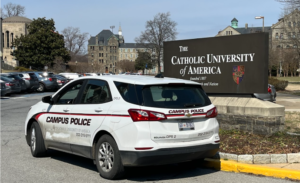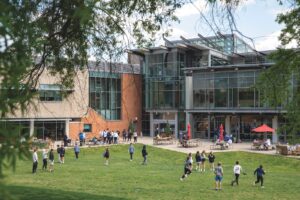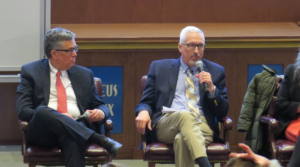Biology Club Invites Guest Speaker Dr. Byung Min (Justin) Chung
By Angela Hickey
On Tuesday, Catholic University’s Biology Club hosted an event in the Pryz Great Rooms and invited the university’s own Dr. Byung Min (Justin) Chung to talk to students about his specialties on epithelial cell biology and cancer research.
Chung teaches biology within the school of Arts and Sciences. He has a B.S. in Chemistry with specialization in Biochemistry from the University of Virginia, a Ph.D. in Cancer Research from Northwestern University, and a Postdoctoral Fellow in Biochemistry and Molecular Biology from the Johns Hopkins School of Public Health.
Many people attended the biology club’s inaugural get together. The club plans to continue with talks throughout the year, inviting numerous speakers to talk to students interested in pursuing scientific fields or who are just interested in science in general.
Chung discussed some of his research with the use of keratin, specifically keratin 19, and its involvement in cancer research. Keratin, a type I keratin, is most recognized as a cell that is used to keep cells together and protect the hair and nails. The type I cytokeratins consist of acidic proteins which are arranged in pairs of heterotypic keratin chains.
During his talk, Chung discussed how doctors study generations of cancer cells in current patients. His research covered how doctors currently have the ability to take patients’ cancer cells, which are ground up and grown in a lab in order to study growth patterns and how to combat cancer in the body—discovering how the cancer cells themselves become cancerous.
Chung went over how breast cancer cells grow, transforming within the epithelial cells and growing rapidly, eventually developing a tumor. Chung stated that 90% of all cancers come from epithelial cells, with the other 10% coming from the blood. With those epithelial cells comes Keratin, which Chung stated is essential in cancer research.
One of the proteins, keratin 19, was discovered to have a direct connection to breast cancer. Chung discovered that patients with high keratin 19 levels in the tumor can lead to the patients’ levels of survival increasing as compared to patients with lower levels of keratin 19.
Chung experimented by removing keratin 19 from the cancer cells and seeing how the cancer developed from that point onward.
“Breast cancer is a very heterogeneous disease,” Chung said. “It’s not just one disease, it’s a collection of many different diseases.”
Two breast cancer patients can have completely different types of tumors— for example, Luminol A and Luminol B. But Keratin 19 is robustly expressed in all of them, particularly in estrogen receptor-positive breast cancers. Chung was able to target the keratin 19 in an estrogen receptor-positive breast cancer patient and discovered that with the help of a drug that attacks the keratin 19 cells, the growth of cancer cells had rapidly decreased within 24 hours. Chung used his knowledge in order to not only rid patients of breast cancer, but to also keep the cancer from returning entirely.Chung and his associates were able to make great advances in the fight for breast cancer prevention. The full lab report of Chung’s research “Keratin 19 regulates cell cycle pathway and sensitivity of breast cancer cells to CDK inhibitors” is available at www.nature.com.






